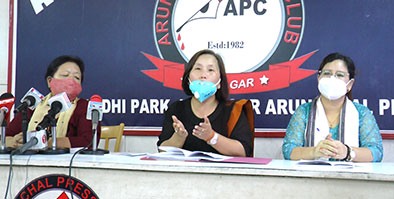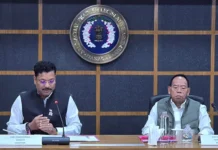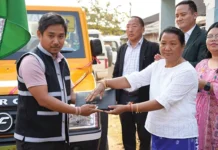Staff Reporter
ITANAGAR, 21 Aug: The Arunachal Pradesh State Commission for Women (APSCW) and the Arunachal Pradesh Women’s Welfare Society (APWWS) on Saturday cleared the air on the Arunachal Pradesh Marriage and Inheritance of Property Bill, 2021, and informed that the draft that is circulating on social media is an old draft and should not be confused with the latest draft of the bill.
Addressing reporters at the press club here, APSCW Chairperson Radhilu Chai Techi said: “People are calling out Section 39 of the draft bill repeatedly, but the matter (pertaining to the property rights of an APST woman married to a non-APST man) is in Sections 42 and 43 and not Section 39.”
Section 42, which deals with the ‘Right of an APST woman married to non-APST on inherited immoveable property’, states that “An APST woman married to non-APST man shall enjoy any immovable property inherited from the head of the family in her lifetime, subject to
the basic limit that the properties so inherited would devolve, in the event of her death, upon the heirs of her ancestors from whom she inherited.”
Techi explained that “Section 42 ensures that the ancestral property that the APST woman has acquired from her parents will go back to the family (her parents/brothers/sisters) upon her death.”
Section 43 deals with the ‘Right of an APST woman married to non-APST on immoveable property owned and acquired by her’.
According to the draft section of the bill, “An APST woman married to non-APST man shall enjoy the right of any immovable property owned and acquired by her in her lifetime. In the event of her death, her husband and her heirs would have full rights of it for disposal and alienation to any indigenous tribal of Arunachal Pradesh.”
“This means that if an APST woman has made or acquired property on her own and has not inherited it (from her parents), her husband and children will have the right to sell it off to any indigenous person. It is after all the woman’s hard-earned money. Nowhere is it mentioned that the property will go to a non-APST,” Techi said.
“However, if the government feels that there is some issue with the sections, then they can add clauses to it or make changes to it. The property rights in this section do not involve ancestral property,” she said.
Techi also clarified that the bill was not drafted overnight.
“The APWWS has been working for women’s rights since 1979 and these issues have been part of their struggle since then. The issue has always been a priority of the commission since its establishment in 2005,” she said.
In recent times, the APSCW held a two-day seminar in 2020, where discussions were held on customary laws, marriage and property rights with community-based organizations (CBO), NGOs, resource persons, academicians, experts, and the women & child development (WCD) secretary and minister. It held another three-day seminar on the occasion of the International Women’s Day on 8 March, 2021 on customary practices and property rights of women and girl child in the context of Arunachal.
She informed that all the CBOs, student unions, gaon burahs, the WCD department, the Arunachal Pradesh State Legal Services Authority, the APWWS and academicians were invited to hold discussions on whether girls should get property rights or not.
“Participants were divided into groups, and each group came up with the decision that women and the girl child should be given property rights and polygamy should come to an end through legal processes,” she said.
Subsequently, the commission formed a drafting committee consisting of senior advocates and advocates to draft a bill, keeping in view and considering the Special Marriage Act, 1954, the Hindu Marriage Act, 1955, the Christian Marriage Act, 1872, and the Mizo Marriage, Divorce and Inheritance of Property Act, 2014.
“On 11 July, at the initiative of the APSCW, a bill was drafted by the drafting committee and all the CBOs and their women wing teams, advocates from the bar association, the APWWS, organizations, and academicians were invited. Each section of the bill was discussed clause by clause. And on 25 July, the final drafting committee meeting was held at DK Convention Hall with representatives of the Arunachal Pradesh State Legal Services Authority, the BJP Mahila Morcha, the All Arunachal Pradesh Students’ Union, the NES women’s wing, and the Arunachal Pradesh Women’s Welfare Society and APSCW members. There was a discussion on each and every section of the bill and then only was the latest bill drafted.”
“We had three rounds of meeting and three continuous years of seminars and legal awareness programmes in each district regarding the matter, so it is wrong to assume that we came up with the bill overnight,” Techi said.
She informed that the draft copy of the bill was submitted to the government, and Chief Minister Pema Khandu had said that he would look into the matter, but that a wider consultation was necessary before taking a final decision.
She said that she also requested the CM to ensure that all the CBOs are asked to attend the consultation session, “because when we send 3,000 to 5,000 invitations for their participation in seminars, hardly 300 to 400 of them attend. And when we place a bill, they say they have not been asked and they have not been consulted.”
“We are happy that a discussion has started on the matter, but we would request the masses not to look at it with negativity. If you feel that any of the section is not acceptable, you should place your grievances through your NGOs or CBOs,” she said.
On remarks that the women’s commission should only discuss polygamy and not property rights, Techi said that “these two are deeply interlinked.”
“How will we remove polygamy when the first wife is under economic pressure as she cannot go back to her parents and claim even five percent of property? At the moment, only influential families are able to give property to their girl child. If there is a bill that says all girls should get property rights, then it will ensure that all girls and women get property rights. The day a woman’s husband finds another woman, she has to accept the second wife or is shown the door. And because the woman has to think about the welfare of her children, she accepts polygamy,” Techi said.
“When your husband has committed polygamy and you don’t want to be in that relationship, you will have an option, you will have security,” she pointed out.
On claims that the commission and the APWWS are denying customary practices by limiting the exchange of mithuns in marriage ceremonies, Techi said, “We are not denying anyone of their customary practices, but we have written that one should not exceed the limit of one mithun during marriages.”
“The price of mithuns is soaring and one mithun is around Rs 1 lakh. We have cases of child marriages that come in the commission. The clan members of the husband do not leave the girl till her family pays for the mithuns. She is often kidnapped. Which is why we have said that marriages will be held according to customary practices, provided the exchange of mithuns is minimal, so that women do not suffer,” she said.
APWWS president Gumri Ringu, who is also the Arunachal Pradesh State Commission for Protection of Child Right’s chairperson, pointed out that “the online trolling and personal attacks on women who are mothers, daughters, and even grandmothers are unbecoming of the public.”
“It was also very disheartening to see messages that said why the chief minister should receive our representation. We are statutory bodies for women and child rights. We have the right to submit a memorandum to the chief minister. People are asking him to step down and for us to resign. How can you except the CM to step down for every single thing?” she said.
In the meantime, the commission requested the general public and stakeholders to keep peace and not attack anyone on personal ground as “the draft bill is in its initial stage where suggestions, views, and debates are needed.”



